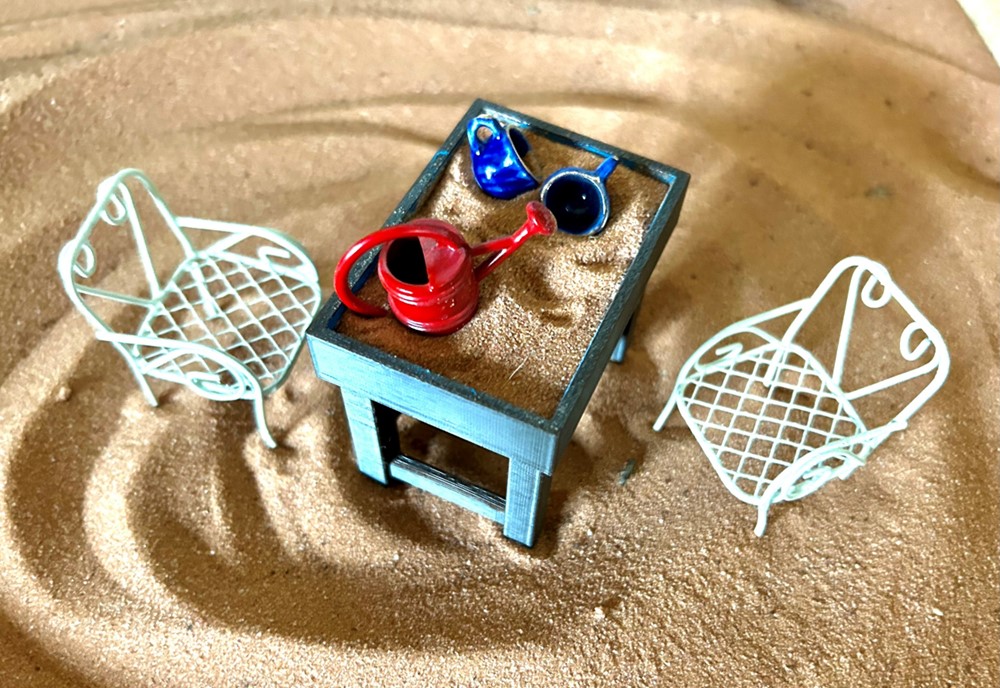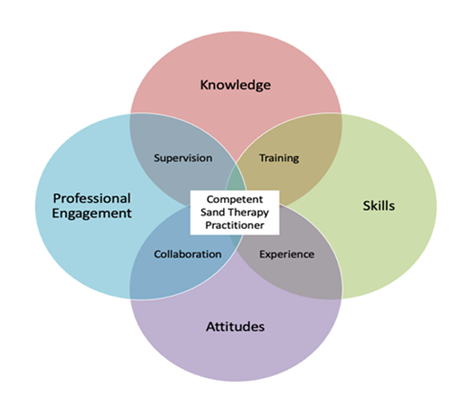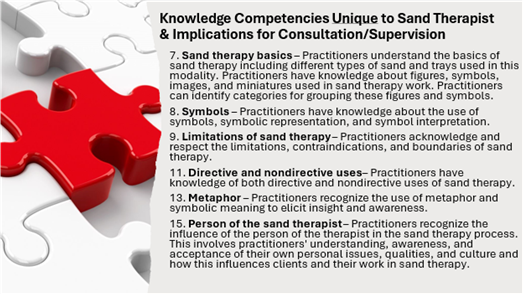
Supervision and Consultation of Sand Therapy Practitioners
Linda Homeyer
Homeyer & Associates
Canyon Lake, TX, USA
https://orcid.org/0000-0001-8429-1375
There are no known conflicts of interest to disclose.
Correspondence concerning this article should be addressed to Linda Homeyer at Lhomeyer@txstate.edu
https://doi.org/10.58997/wjstp.v2i2.81
This is the conference proceedings from Dr. Linda Homeyer's presentation entitled, Supervision and Consultation of sand Therapy Practitioners.
Supervision and consultation for sand therapy practitioners differ for general clinical supervision because, in part, of the primary use of toys, symbols, and metaphors. These visual and nonverbal images impact how we, as supervisors and consultants, work to develop competent sand therapy practitioners. These distinctions are identified and discussed during this presentation. Participants at the conference had time to create a tray to explore this (using toys, symbols, and metaphors in sand therapy supervision), with the prompt "How does the use of objects in the sand influence and or change the supervision or consultation process."

We tend to use the word supervision when also referring to consultation. However, supervision is an intensive, interpersonally focused, one-to-one relationship in which one more experienced person (supervisor) is designated to facilitate the development of therapeutic competence in the other, less experienced person (supervisee). The supervisor is responsible for the quality of professional services offered to the clients the supervisee sees and serves as a gatekeeper for the profession the supervisee seeks. These are essential ethical and legal responsibilities. Supervisory roles include teacher, evaluator, and consultant. The teacher's role includes skill development and direct teaching or referring to trainings to fill gaps in their knowledge base, which are seen most frequently in the early stages of supervision. The consultant role emerges more toward the end of the supervisory relationship when professional development issues emerge, and the relationship shifts to one more colloquial. The evaluator role continues throughout as the supervisor is the ultimate gatekeeper of competency for the profession. Throughout, the development of the person of the sand therapist is critical. It is often not discussed sufficiently. Supervisors, unfortunately, too frequently focus only or primarily on case management issues. However, the person of the sand therapist is critical to competent care.
Consultation differs from supervision in that the individuals typically referred to as supervisor and supervisee both hold their own clinical mental health licenses issued by their respective state licensing boards that permit independent practice. In consultation, the consultor is asked to share expert advice and clinical guidance specific to adding sand therapy to the existing competent care being provided by the consultee. For those consultants working with new sand therapists (or play therapists), teacher and evaluator roles remain essential. For this presentation, the term supervisor is used for both roles.

The World Association for Sand Therapy Practitioners (WASTP) sponsored research to identify competencies for sand therapists (Hartwig et al., 2023). The Association for Play Therapy (APT) has previously researched competencies (Turner et al., 2020). WASTP's research has four areas of competencies (Figure 1) while APT has three (not including Attitudes). There is also overlap and commonalities of several items. The notations for each item in the WASTP and APT lists are in parentheses.
Knowledge Competencies
Sand Therapist - 15 items total
- Theories (2) know variety; identify with one; able to apply
- Trauma (5) accessing embedded trauma; trauma images/senses; trauma-informed care
- Development (6) lifespan
- Diversity (10)
- Ethics (12)
- Healing power of play (14)
Play Therapist - 11 items total
- Seminal/historically significant theories (1d)
- Trauma (1j) impacts of childhood trauma
- Development (1e) childhood
- Diversity (2g,h; 3h)
- Ethics (3b,c)
- Therapeutic powers of play (1b)
Skill Competencies
Sand Therapist - 7 items listed
- Therapeutic presence (1) unconditional witnessing and nonverbals, and Basic Skills (3)
- Application of theory (2)
- Cultural inclusion, awareness, and humility (5) awareness of, and embody skills
Play Therapist – 10 items listed
- Demonstrate basic play therapy skills (2e) tracking, reflecting, limit setting, etc.
- Demonstrate skills congruent with theory (2j)
- Cultural and social diversity (3h) seek and integrate
Professional Engagement Competencies
Sand Therapist – 4 items listed
- Ongoing consultation/supervision (1)
- Ongoing training (2)
- Collaboration with other professionals (3)
- Ongoing personal work (4)
Play Therapist – 8 items listed
- Seek and integrate play therapy-specific continued education, research, and literature (3e)
- Seek and integrate play therapy-specific supervision/consultation (3f)
- Maintain … credentials and involvement with professional play therapy organizations (3a)
- Practice self-care (3g)
WASTP research additionally identified items that are unique to the development of competent sand therapists. Figures 2, 3, and 4 list these specific items. The WASTP research sought to identify competency items essential to all clinical theories and approaches to sand therapy. As such, these impact the content of supervision. Supervisors, in the evaluator role, assess the supervisee's knowledge, skills, and professional engagement competencies. As our field develops the training of sand therapy supervisors these competencies for sand therapist practitioners will inform and deepen the richness of their work. During this breakout session at the conference, participants developed experiences that sand therapy supervisors could use to explore and develop these competencies in the sand therapy supervisee.


Unique to sand therapy consultation, research found the following:
- Attitudes Competencies: Practitioners value ongoing consultation, supervision, and training.
- Professional Engagement Competencies: Practitioners engage in ongoing consultation and supervision, even if they are already licensed and/or have years of professional practice.
As a global association, WASTP serves sand therapy practitioners who practice under a variety of rules and requirements unique to their specific jurisdictions (countries, states, or regions). Some jurisdictions already require ongoing consultation throughout their professional careers. Other jurisdictions do not require any amount of supervision or consultation. This research, however, identifies that ongoing consultation is important for continued competency.
A final and fourth area of competency, identified in the research project, is Attitudes. This is important as supervisors work to develop the person of the sand therapist.
Sand Therapist Attitudes (Person of the Sand Therapist)
- Trust/respect client – Practitioners demonstrate trust and respect of the client and what they bring to the sand therapy session.
- Trust/respect process – Practitioners demonstrate trust and respect of the client's process and how they engage and resp in the sand therapy session.
- Openness – Practitioners demonstrate openness, curiosity, patience, and flexibility in the sand therapy process.
- Humility – Practitioners demonstrate humility by reducing the emphasis of the therapist as all-knowing and increasing emphasis on the clients as expert in their own lives and experiences.
- Unconditional positive regard – Practitioners value unconditional acceptance and respect for the client without evaluation or judgment.
- Powerful work – Practitioners acknowledge that sand therapy is powerful work that can uncover deeply held beliefs, values, memories, and experiences.
- Ongoing consultation/supervision and training – Practitioners value ongoing consultation, supervision, and training.
This presentation was interactive with the participants who added value to the ongoing development of the role of the sand therapy supervisor.
References
Drewes, A. & Mullen, J. (Eds). (2023). Supervision can be playful. Rowman & Littlefield.
Friedman, H. S., & Mitchell, R. R. (Eds.). (2007). Supervision of sandplay therapy. Routledge.
Hartwig, E. K., Homeyer, L., & Stone, J. (2023). Sand therapy competencies: A qualitative investigation of competencies for sand therapy practitioners. World Journal for Sand Therapy Practice®, 1(5). https://doi.org/10.58997/wjstp.v1i5.32
Homeyer, L., & Lyles, M. (2023). Advance sandtray therapy: Digging deeper in clinical practice. Routledge.
Homeyer, L., & Stone, J. (2023). Sand therapy standards: Views from the field. World Journal for Sand Therapy Practice, 1(1), 1-11. https://doi.org/10.58997/wjstp.v1i1.4
Ray, D. (2004) Supervision of basic and advanced skills in play therapy, Journal of Professional Counseling: Practice, Theory & Research, 32(2), 28-41. https://doi.org/10.1080/15566382.2004.12033805
Turner, R., Schoeneberg, C., Ray, D., & Lin, Y. (2020). Establishing play therapy competencies: A Delphi study. International Journal of Play Therapy. 29(4), 77–190. https://doi.org/10.1037/pla0000138
Original content from this work may be used under the terms of the https://creativecommons.org/licenses/by-nc-nd/4.0/. Any further distributions of this work (noncommercial only) must maintain attribution to the author(s), the title of the work, journal citation, and DOI.
© World Association of Sand Therapy Professionals, World Journal for Sand Therapy Practice, Volume 2, Number 2, 2024